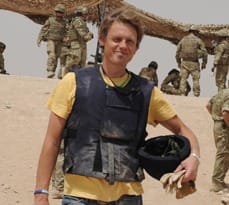What lessons can organisations take from the high-performance surgical teams at Britain’s Camp Bastion military hospital in Afghanistan?
Dr Mark de Rond, Reader in Strategy & Organisation at Cambridge Judge Business School, is full of admiration for the surgical teams working in the 50-bed hospital at Camp Bastion, Britain’s military base in Afghanistan.
Embedded with a team of surgeons for 6 weeks, he wanted to look into high performance teamwork in difficult circumstances and to explore why some teams are more effective and more coordinated in challenging environments.
“Do they become more clear-headed? Do they go for default responses, which is often the case in human nature? What do people get up to in extreme environments? My assumption is if we put people under pressure collectively, we can observe the same sorts of tensions that may exist in teams in ordinary life but in a way that is exacerbated, so that the world becomes more black and white.”
The most effective teams he has studied to date, Dr de Rond was surprised to see how unstable surgical teams become when there is not enough work to go round.
One of the greatest risks to team stability, he explains, is boredom. Under pressure, teams of high performers function exceptionally well. But when bored, the qualities that produce exceptional performance under pressure risk destabilising the team.
“The problem is when sometimes days go by and they are inactive. It’s bad news for the surgeons because there is not much else to do aside from a bit of fitness. These are people who are programmed to work hard and they find it very difficult to sit still.”
They become reflective, says Dr de Rond, about the war and the relative futility of a lot of the work they do, especially with local nationals. They also become critical not only of their own work but also that of the people around them.
“The issue from a management perspective is that you’ve got to understand how to deal with a relative sense of futility, how to deal with boredom, and that can be a real struggle for the people in charge.”
Dr de Rond thinks the key to high performance teams is disarmingly straightforward: provided people are capable, give them something to care about more than themselves. The problem is that you cannot do this continuously. Not even at times of war.
“I was surprised by the fact that high-performance teams can show you the best of two worlds when things get difficult. These are the people you would want to have around but also the worst of that world because they become very difficult to manage if there is not enough work to go round.”
He was also concerned about a lack of ‘psychological safety’ which he observed in the medical teams, which he says is not uncommon in other organisations when more junior team members are reluctant to speak out and express their opinions.
Conflicting opinions in teams are important, Dr de Rond explains, not just because they smoke out assumptions and enlarge the pool of available information, but because they reveal what matters most to those involved.
Dr de Rond also believes teams are not always the answer to many organisational problems. Managing them effectively can be difficult, and if a task is suited to a working group or individual, teams are sometimes best avoided altogether.
He recommends that instead of trying to force people to work in teams, many organisations would be far better off creating a psychologically safe working environment, or one where people, however junior or inexperienced, won’t hesitate to speak out when they disagree, or worry about, where the organisation is heading.
Dr Mark de Rond is a Reader in Strategy & Organisation at Cambridge Judge Business School and a Fellow of Darwin College, University of Cambridge.


